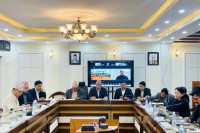National
On the horns of a dilemma: To restrict imports or make the revenue
Private sector for hiking duties to curb imports instead of banning foreign goods amid looming economic crisis.
Prithvi Man Shrestha & Krishana Prasain
The government is wrestling with a dilemma. It wants to control imports of oil and luxury goods to save foreign currency; but if it moves against these high tax generators, it will hit revenue collection which may lead to an economic crisis.
The Nepal Rastra Bank has already ordered commercial banks not to issue letters of credit for the import of vehicles and other luxury goods while urging the government to control imports and consider a two-day weekend policy.
The central bank’s response follows growing concerns that the country may be headed Sri Lanka's way as it faces a widening trade deficit, soaring balance of payment deficit, and decreasing remittance inflows and foreign exchange reserves.
But the government is yet to reach any decision on those recommendations. As the administration wavers, the private sector has started lobbying to have the import restrictions thrown out because sales of automobiles, alcohol and cell phones swell during election season.
The private sector has suggested hiking customs duty to discourage imports instead of an outright ban on foreign goods.
Experts say that these private sector suggestions may trigger runaway prices and pose a great risk to the economy too. For example, if the price of chicken fodder, which is mostly imported, were to rise, chicken prices could double or even triple, turning the common meat into a luxury item.
Various trade bodies have been meeting Finance Minister Janardan Sharma from last week requesting him not to impose import restrictions.
A delegation of the Confederation of Nepalese Industries (CNI) on Monday called on the finance minister and urged him to refrain from banning imports.
The CNI said in a press statement that instead of prohibiting imports, the government could raise import duties and interest on import loans.
On Sunday, representatives of the automobile sector met Finance Minister Sharma and requested him not to check the import of vehicles as election season usually means a sales bonanza for car dealers.
“We met the finance minister on Sunday and appealed to him that there was no need to restrict imports of vehicles because it’s a major source of government revenue,” said Dhurva Thapa, president of the Nepal Automobiles Dealers’ Association.
“We have informed the government not to classify vehicles as a luxury item and unproductive sector as it is the country’s major revenue earner. The finance minister is positive towards our appeal.”
The Association of Nepalese Rice, Oil and Pulses Industry has also urged the government to slap hefty import duties on rice and lentils of up to 15 and 20 percent respectively to discourage imports that have been draining Nepal’s foreign currency reserves.
Representatives of the Nepal Foreign Trade Association on Monday met with Industry, Commerce and Supplies Minister Dilendra Badu and complained about the difficulties they were facing after the central bank issued a provision requiring importers to maintain 100 percent margin amount to open letters of credit for certain goods.
But experts say that an import ban on certain goods would be essential because measures like keeping 100 percent margin amount have failed to slow soaring imports.
“This is a special situation which cannot be addressed without forcefully controlling imports,” said senior economist Govinda Nepal. “This is a time for both consumers and businesses to make a sacrifice.”
He said without timely intervention, the situation may worsen and may lead the country in the direction of Sri Lanka.
But the business community has been arguing that an outright import ban could result in black marketing and price hikes. “The government should take effective administrative measures to stop such activities,” said Nepal, who is also a former member of the National Planning Commission.
Over the past months, inflation has surged, foreign exchange reserves have dropped and the ill-advised hike in duties and taxes may turn things from bad to worse, said consumer rights activists.
“Consumers always suffer from the government’s faulty policies—from all sides,” said consumer rights activist Madhav Timalsina. “The election manifestos of the parties and political leaders are so lofty and full of promises.”
“But they never talk about nutritious food, accessible supply chain and fair market prices. We call this political ‘fraud’ that is supported by the vested interests of a handful of businessmen. Elections are the time when politicians and businessmen profit and consumers suffer."
While the government is not keen to make the private sector unhappy, as import restrictions would be politically unpopular, it is betting on one token move—cutting supply of fuel to vehicles owned by the government and hundreds of its agencies.
But insiders say such a move will barely dent the country’s massive imports—chiefly consisting of oil, vehicles, mobile phone sets and farm goods—which reached a whopping Rs1,308.73 billion as of the first eight months of the current fiscal year, a jump of 38.6 percent from last year.
A rough estimate shows that a 20 percent cut in the fuel bills of the government and its agencies will result in savings of Rs524 million, equivalent to a mere 1.49 percent of the country’s total oil import bill.
According to the Financial Comptroller General's Office, which keeps records of the government’s income and expenditure, government agencies spent Rs2.62 billion on fuel in the last fiscal year 2020-21.
On April 13, the Cabinet decided to cut spending on fuel for vehicles owned by government agencies, ministries and public enterprises by 20 percent.
The government issued a public notice in this regard on Monday.
The directive to slash fuel consumption by 20 percent has been implemented and will last until the end of the current fiscal year in mid-July 2022.
The decision does not apply to development projects, law and order agencies, essential services and activities of the upcoming local elections.
The government had earlier decided to slash fuel expenses by 10 percent through a replacement bill in September, but it decided on a steeper cut amid widening trade deficit, decreasing inflows of remittance and depleting foreign exchange reserves, the Finance Ministry said in a circular on Monday.
Nepal imports huge amounts of petroleum products. A surge in oil prices sparked by the Russia-Ukraine war has hit Nepal hard as it depends heavily on imported foods, edible oil, luxury items and fuel.
Nepal imported more fuel in the first eight months of the current fiscal year 2021-22 than it did in the whole of the last fiscal year.
“The government’s move to cut fuel consumption is a totally cosmetic move,” said economist Nepal. “Though the government appears to have recognised the problem, it will not make a difference in reducing the trade deficit and stopping depleting foreign exchange because of the insignificant contribution of fuel consumption by government agencies in the overall fuel imports.”
Nepal’s petroleum import bill in the last fiscal year stood at Rs175.53 billion, according to the Trade and Exportation Promotion Centre.
The petroleum import bill as of the first eight months of the current fiscal year that ended mid-March reached Rs184.98 billion, making oil the country's largest import.
Fuel accounted for 14 percent of the country’s total import bill, according to the centre.
“Expenses on fuel for the government and its bodies are not that large,” said an unnamed official of the Financial Comptroller General's Office.
“Issuing such a policy just three months ahead of the end of the fiscal year will not make any big difference. It should have been implemented from the beginning of the fiscal year. But even that would not have made a significant difference.”
A senior Finance Ministry official defended the government’s move saying it would help reduce fuel expenses of government agencies because petrol prices had risen along with prices of other petroleum products.
“It is part of wider measures to cut fuel consumption. If we didn’t decide to cut consumption, spending on fuel would continue to grow,” said Dhundi Prasad Niraula, spokesperson for the Finance Ministry.




 23.27°C Kathmandu
23.27°C Kathmandu
















